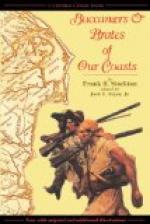Here were rollicking and blustering “flibustiers,” and here the young man determined to study piracy. He was not a sailor and hunter who by the force of circumstances gradually became a buccaneer, but he deliberately selected his profession, and immediately set to work to acquire a knowledge of its practice. There was a buccaneer ship about to sail from Jamaica, and on this Morgan enlisted. He was a clever fellow and very soon showed himself to be a brave and able sailor.
After three or four voyages he acquired a reputation for remarkable coolness in emergencies, and showed an ability to take advantage of favorable circumstances, which was not possessed by many of his comrades. These prominent traits in his character became the foundation of his success. He also proved himself a very good business man, and having saved a considerable amount of money he joined with some other buccaneers and bought a ship, of which he took command. This ship soon made itself a scourge in the Spanish seas; no other buccaneering vessel was so widely known and so greatly feared, and the English people in these regions were as proud of the young Captain Morgan as if he had been a regularly commissioned admiral, cruising against an acknowledged enemy.
Returning from one of his voyages Morgan found an old buccaneer, named Mansvelt, in Jamaica, who had gathered together a fleet of vessels with which he was about to sail for the mainland. This expedition seemed a promising one to Morgan, and he joined it, being elected vice-admiral of the fleet of fifteen vessels. Since the successes of L’Olonnois and others, attacks upon towns had become very popular with the buccaneers, whose leaders were getting to be tired of the retail branch of their business; that is, sailing about in one ship and capturing such merchantmen as it might fall in with.
Mansvelt’s expedition took with it not only six hundred fighting pirates, but one writing pirate, for John Esquemeling accompanied it, and so far as the fame and reputation of these adventurers was concerned his pen was mightier than their swords, for had it not been for his account of their deeds very little about them would have been known to the world.
The fleet sailed directly for St. Catherine, an island near Costa Rica, which was strongly fortified by the Spaniards and used by them as a station for ammunition and supplies, and also as a prison. The pirates landed upon the island and made a most furious assault upon the fortifications, and although they were built of stone and well furnished with cannon, the savage assailants met with their usual good fortune. They swarmed over the walls and carried the place at the edge of the cutlass and the mouth of the pistol. In this fierce fight Morgan performed such feats of valor that even some of the Spaniards who had been taken prisoners, were forced to praise his extraordinary courage and ability as a leader.
The buccaneers proceeded to make very good use of their victory. They captured some small adjoining islands and brought the cannon from them to the main fortress, which they put in a good condition of defence. Here they confined all their prisoners and slaves, and supplied the island with an abundance of stores and provisions.




